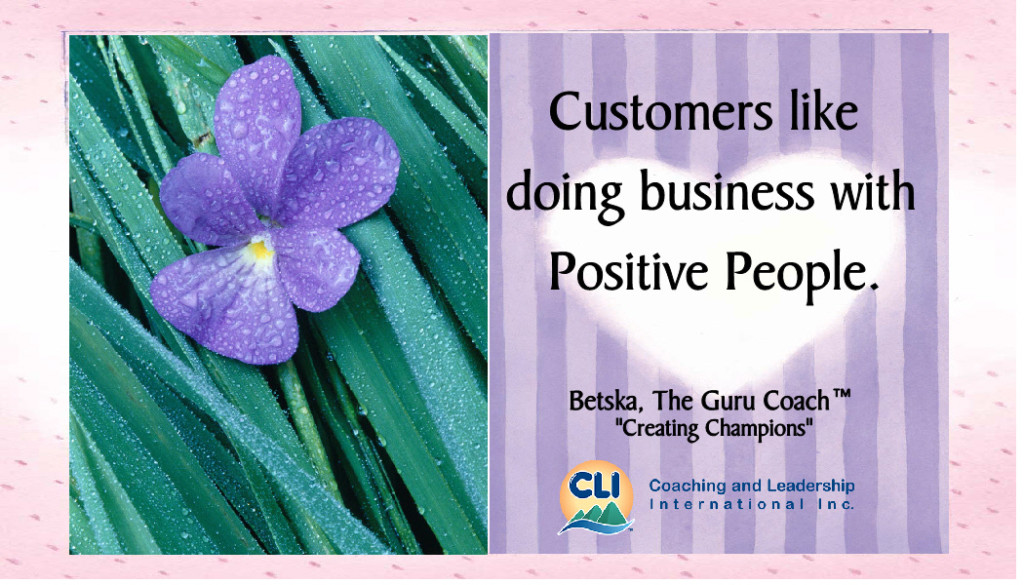Tag Archives: ICF Certified Life Coach
Are you Accepting Good Enough?
Are you a Leader who accepts Good Enough?

If you are accepting status quo as good enough then you can bet that you are leading your team to nowhere. Challenging the current state of affairs and questioning the way “it is normally done here” attitude is the only sure way to improvement and remain competitive.
Whether you wish to improve your professional leadership at work or your personal leadership with your family, we invite you to use CLI’s phenomenal scientific brain game called “The Brain Walk®“ to identify immediate solutions to challenges that are hiding in your subconscious mind. We call these blind-spots. Got any of those? We all do!
True leaders at any rank within the organization, love themselves and their organization so much that they are committed to going inside self and finding the courage and the ability to suggest and implement change. They simply do not accept Good Enough in the workplace. Even if something is working, it can always be improved.
Betska, The Guru Coach™
Sign up for CLI QuickTip™ and Blog Updates at:
Coaching and Leadership International Inc.
What did John F. Kennedy say about Leadership?
Looking back, John F. Kennedy was probably one of the most advanced leaders in our global history.
Listening again to his “Commencement Address at American University in Washington,” June 10, 1963. I am struck by his deep insights into global issues and what we as leaders could do to create a better world.
Kennedy’s now famous speech is on “World Peace” which he described as “the most important topic on earth”.
Let’s study some excerpts from his address:
“What kind of peace do I mean? What kind of peace do we seek? Not a Pax Americana enforced on the world by American weapons of war. Not the peace of the grave or the security of the slave. I am talking about genuine peace, the kind of peace that makes life on earth worth living, the kind that enables men and nations to grow and to hope and to build a better life for their children–not merely peace for Americans but peace for all men and women–not merely peace in our time but peace for all time.”
“Some say that it is useless to speak of world peace or world law or world disarmament-and that it will be useless until the leaders of the Soviet Union adopt a more enlightened attitude… But I also believe that we must re-examine our own attitude–as individuals and as a Nation–for our attitude is as essential as theirs. And every … thoughtful citizen who despairs of war and wishes to bring peace, should begin by looking inward–by examining his own attitude toward the possibilities of peace, toward the Soviet Union, toward the course of the cold war and toward freedom and peace here at home.”
“Our problems are man made–therefore, they can be solved by man. And man can be as big as he wants. No problem of human destiny is beyond human beings. Man’s reason and spirit have often solved the seemingly unsolvable–and we believe they can do it again.”
“World peace, like community peace, does not require that each man love his neighbor–it requires only that they live together in mutual tolerance, submitting their disputes to a just and peaceful settlement.”
“… a warning to the American people not to fall into the same trap as the Soviets, not to see only a distorted and desperate view of the other side, not to see conflict as inevitable, accommodation as impossible, and communication as nothing more than an exchange of threats.”
To me, the important messages jumping off the page are “peace for all time”, “every thoughtful citizen should begin by looking inward – by examining his own attitude”, “no problem of human destiny is beyond human beings”, “World peace … requires … submitting their disputes to a just and peaceful settlement”, and very common on the world stage is “communication as nothing more than an exchange of threats”.
I remember my first Life Coach, Jan Sweeney, being very pointed with me when she said, “Betska, if you really want to help the world you must first heal your own negative beliefs … all that sabotage that is going on inside of you.” Taking her statement to heart, I worked tirelessly (and still do) to change my negative beliefs, my prejudices (OMG I had a lot!) and sabotaging actions by understanding The Universal Law of Belief, ‘What you think, you become.”
Where do we find war today other than between countries and for religious ideology? Well, we have wars going on at home between spouses and wars between parents and children and so on. At work, we have wars right at the top in the executive suite usually based on ego, desire for selfless power and lack of trust. At work we also have wars between managers and their direct reports and between departments.
Many of you have read this now famous story in my latest book, The “God” in Coaching – The Key to a Happy Life. I remember complaining to Jan about my husband John – that he was a lousy communicator. Well, Jan gently pointed out to me that the Universal Law of the Mirror was at play here. In other words, the characteristic I saw in my husband which generated negative emotions within me, was also in me. Of course, I resisted looking at myself as I declared, “I am not a lousy communicator. Heaven’s no!” Hah! The truth is that I was, once I admitted it to myself. When John came home from work that evening I sat down on the couch with him and apologized for being in judgment of him all those years – for blaming him when I really should have thanked him for the gift of helping me see my true self.
Whether it is at home, at work or on a more universal front, as stated by Mr. Kennedy, we often resort to using communication as a means to exchange threats instead of choosing to listen, understand and lovingly communicate with each other.
Listening to Ourselves – can we hear our intuition?
As most of you know, I am a great believer in being ‘in the silence’ for at least 30 minutes per day. My often frantic Executive Coaching Clients run from meeting to meeting and from work to soccer or cricket field without taking a breath. Baba Ram Dass has some wise words for us.
 “Inner peace brings world peace” is another one of my favorite sayings. Before we can achieve world peace, we must find inner peace. Peaceful people don’t go to war. (Tweet this)
“Inner peace brings world peace” is another one of my favorite sayings. Before we can achieve world peace, we must find inner peace. Peaceful people don’t go to war. (Tweet this)
The more we can go inside and listen to our real selves, the more peaceful we will become and then we can bring that peace into our interactions with others. People can feel it. Who knows, they may even want some for themselves! It would save a lot of heart attacks, don’t you think?!
Mr. Kennedy would be proud of us.
Listening to Others – can you hear what they are really saying?
One of CLI’s coach training students mentioned that at one time he couldn’t listen to others because he always felt they were wrong! It was appropriate to share with ‘Donald’ that “Listening is the art of physically hearing someone else’s thoughts and opinions, understanding what they’re saying and considering change as a result of it.”
As a leader, in order to create more leaders, his job was to listen to others so that he could discern what support his direct reports needed from him. Donald left his selfish behavior behind and is now able to more selflessly grow his people.
I don’t know if these facts are true or not but if they are, they are worth considering. I have read that we speak at a rate of 120 to 150 words per minute and think at a rate of 500 to 1000 words per minute. We listen four times faster than we talk. It is no small wonder that we miss a lot of what people say. But there are many barriers to listening:
- Physical fatigue
- Distractions from surroundings as well as from the speaker (dress, mannerisms)
- Emotional hot buttons
- Bias, perceptions, cultural differences
- Daydreaming, internal thoughts
Most of us practice selective listening. We hear what we want to hear. We remember what we want to remember. To confuse things even more, human beings listen at different levels. But this chart below is a marvelous tool for improving our listening skills. Used together, these pointers will develop better listening habits that could last you a lifetime.
HOW TO IMPROVE OUR LISTENING SKILLS
- Listen on all four levels: with our eyes, ears, heart and with undivided attention. Listening with compassionate hearts can be difficult for those taught to not go into the fluffy stuff! .
- Judge the content not the delivery. Nervousness can often affect the delivery.
- Don’t judge the speaker’s content before you understand it.
- Listen for ideas and central themes.
- Practice taking fewer, but more concise, notes.
- Work hard at listening. Show them you’re interested.
- Feedback to people what you think you have just heard.
- Ask questions to ensure full understanding.
- Tune out distractions and be nice! (Don’t answer the phone in the middle of your meeting or keep typing on your computer when someone has entered your office to speak with you. Stop typing and give that person eye contact.)
- Exercise your mind to relate their information to the situation.
- Keep an open mind.
- Capitalize on the fact that thought is faster than speech. Mentally weigh the facts and summarize your thoughts.
“Real Communication works at two levels: head to head and heart to heart.”
How can we put our new improved listening skills to good practice in the workplace?
Here are a few ways to consider:
- Listen well to managers all the way through the organization at meetings and one-on-one;
- Listen to all the employees via suggestion boxes, newsletters, field trips, incentive programs;
- Listen by walking around and talking to people and to customers – ask lots of questions;
- Listen via a third party, have an outside company research the organization on its strengths and weaknesses.
How can we put our new improved listening skills to good practice at home?
Send me an email and share your ideas: Betska@CoachingAndLeadership.com Here is probably the most important one to consider:
Sincerely and every day, tell our people how much we love them. Then we can listen intently to what their heart is trying to say to us.
For those of you who wish to learn greater listening skills, learn how to use Mind-Kinetics® tools in order to coach yourself to get rid of the judgments you have about yourself and others. (I may be biased because I developed them! lol) When we eliminate those judgments, guess what happens? Ta da! We find ourselves in a much better frame of mind and heart space to truly hear what others are saying to us. It’s magical.
Inner Peace Brings World Peace. Thank you Mr. Kennedy for stirring our hearts to truly consider peace. How I long for world peace. I challenge each of you to work with me to make it happen.
Betska, The Guru Coach™
Sign up for CLI QuickTips™ and Blog Updates at:
Coaching and Leadership International Inc
What did Steve Jobs say about Leadership?
In my latest book, The “God” in Coaching, a personal development book, I declared that I was a rebel! My entire life I have been the curious cat … driving people crazy with my questions … challenging people to rise up and truly be the best that they can be.
Guess who else was a rebel? Steve Jobs. My hero. As one of the most creative minds of the 20th and 21st century, and a brilliant visionary, he forever changed how we think about innovation. Like me Steve was a vegan. It seems the vegan diet greatly lengthened his life because I understand he had pancreatic cancer for 30 years.
During one of his speeches, Steve made a provocative statement, “Innovation distinguishes between a leader and a follower.” Love that quote!
So the question is, as a leader how do we encourage innovation?
 I have a firm belief that if a leader creates a family atmosphere in their organization, the employees will feel safe which then creates a playground for creativity – in other words they take risks, think outside of the norm and do their work without fear of reprisal or getting fired and so on.
I have a firm belief that if a leader creates a family atmosphere in their organization, the employees will feel safe which then creates a playground for creativity – in other words they take risks, think outside of the norm and do their work without fear of reprisal or getting fired and so on.
There are numerous ways to create that playground, to breathe life and fun into the organization, many of which you will find in this chart — 27 Ways to Create a Family Atmosphere for Creative Thinking. For example, it is conceivable that Steve encouraged his employees to also eat vegan because his cafeterias were stocked with vegan foods. There is no doubt in my mind that a vegan diet helps us be innovative. Why? Because we think more clearly. We don’t have the karma from eating flesh and dairy to clog up our cells. We are not filling out bodies with the animal’s fear. Incidentally, Google employees can also enjoy free vegetarian food every day!
 Customers like doing business with positive people. The key to having positive innovative people in the organization is a Leader who cares.
Customers like doing business with positive people. The key to having positive innovative people in the organization is a Leader who cares.
When you see your staff smiling constantly, when they accomplish their jobs with zest and responsibility and when they go that extra mile to make the organization successful, you know they’re happy.
“When your staff succeeds, so do you.”
Betska, The Guru Coach™
Creating Champions
Sign up for CLI QuickTips™ and Blog Updates at:
Coaching and Leadership International Inc.












